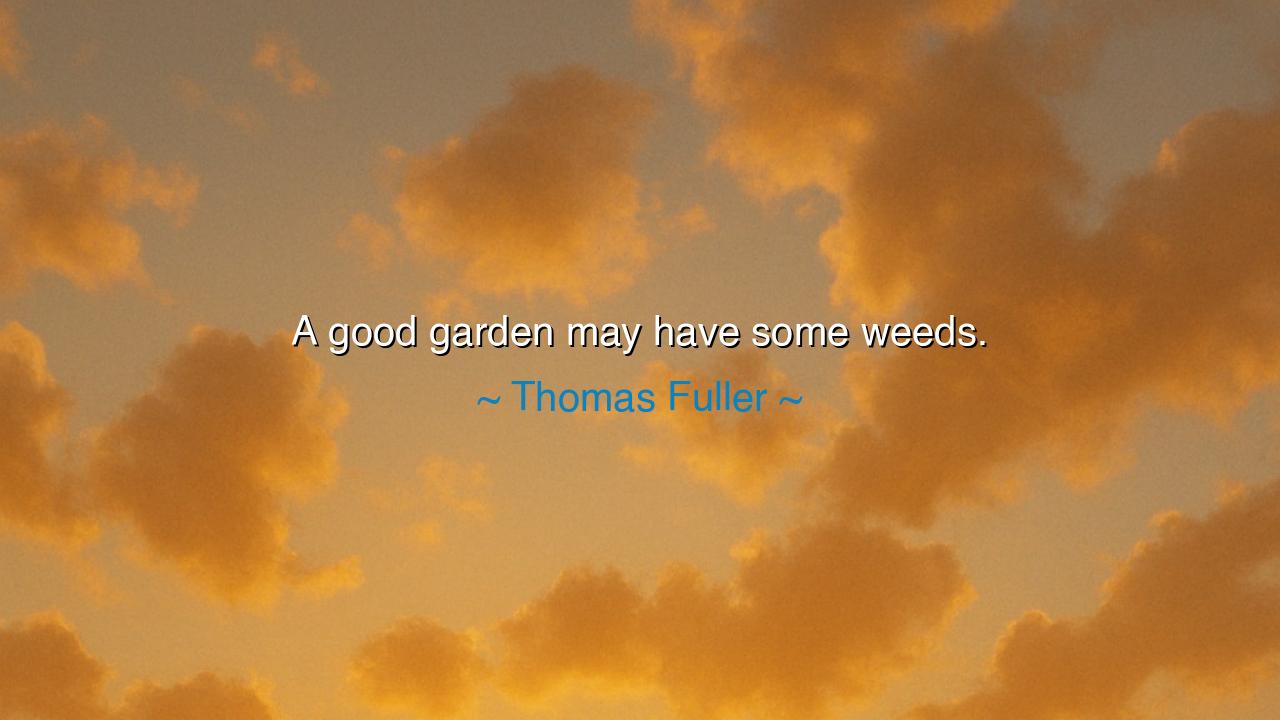
A good garden may have some weeds.






O Seekers of Wisdom, listen well to the words of Thomas Fuller, for within them lies a profound truth about life, growth, and the inevitable presence of imperfection. "A good garden may have some weeds." These simple words hold a deep insight into the human condition and the nature of creation. A garden, though carefully tended and nurtured, will always harbor some form of disorder—whether it is the weeds that seem to grow without invitation or the challenges that inevitably arise in life. Fuller’s wisdom invites us to embrace imperfection and recognize that even in the best of circumstances, the presence of challenges or obstacles does not diminish the beauty or value of what we create.
In the ancient world, gardens were not merely places of beauty, but sacred spaces where humanity’s connection to the divine and the natural world was honored. The Babylonians believed their hanging gardens were one of the Seven Wonders, a place where human ingenuity met nature’s beauty. But even these magnificent gardens were not without their struggles—they required constant care, tending, and the patience to remove what was unwanted. The Greek philosophers spoke of the balance between order and chaos, between the forces of growth and decay. In their gardens, they recognized that even the most carefully designed space could not be entirely free of the weeds of life. Fuller’s insight speaks to this ancient understanding: perfection is not the goal; rather, it is the balance and care we give to what we have created that matters most.
Consider the example of Marcus Aurelius, the Stoic philosopher and Roman Emperor, who, despite his power and influence, found peace in nature and reflected often on the impermanence of life. He saw challenges, even weeds, as part of life’s natural course. His teachings encouraged acceptance of the things we cannot control, acknowledging that the good garden, much like a good life, will always have its share of difficulties. In his meditations, Marcus reflected on the inevitability of imperfection in both the world around us and the soul within us. Fuller’s words echo this Stoic wisdom—just as a garden cannot be free from weeds, so too must we accept that life’s beauty often exists alongside its imperfections.
Let us also recall the Chinese philosophy of Taoism, which teaches the concept of Wu Wei, or the way of non-action, where things are allowed to unfold in their natural state. In the Taoist garden, there is no rigid control, no constant striving to remove all imperfections. Instead, the gardener works with nature, allowing the weeds to exist alongside the flowers, understanding that the natural world operates in cycles of growth and decay. The Taoist master does not resist the presence of weeds, but rather allows them to coexist with the cultivated plants, seeing the beauty in both the order and the chaos. Fuller’s words resonate with this Taoist ideal: a good garden, much like a good life, must allow for the natural flow of both beauty and challenge.
The lesson of Fuller’s words, O Seeker, is profound. Life, like a garden, will always have its weeds—those challenges, imperfections, and struggles that seem to arise without invitation. But these weeds do not diminish the value or beauty of the garden. Instead, they are a part of the natural process of growth, and in their presence, we are reminded of the ongoing work of creation and care. A garden that is too perfect, too controlled, may lack the richness that comes from allowing nature to unfold as it will. In the same way, a life that strives for perfection may miss the beauty that arises from the unexpected, the imperfect, and the difficult.
In practical terms, O Seeker, consider how you approach the garden of your life. Are you striving for perfection, eliminating every challenge and obstacle as a weed to be removed, or are you allowing the natural imperfections to exist, accepting them as part of your growth? Just as a gardener understands that the weeds do not define the worth of the garden, so too must you recognize that the difficulties in your life do not diminish your value. They are simply part of the process—the natural course of things. Embrace the weeds, for they provide the contrast that allows you to see the beauty of what you are creating.
So, remember this, O Seeker: in every garden, in every life, there will be weeds. They are part of the process of growth, and they offer us the opportunity to practice patience, acceptance, and care. Do not be discouraged by them, but instead see them as a reminder that beauty and imperfection can coexist. Tend to your garden with love, patience, and an understanding that the journey is not about eliminating every flaw, but about nurturing life in all its forms. And as you do, you will find that even in the presence of weeds, your life, like your garden, can still be full of beauty.






AAdministratorAdministrator
Welcome, honored guests. Please leave a comment, we will respond soon